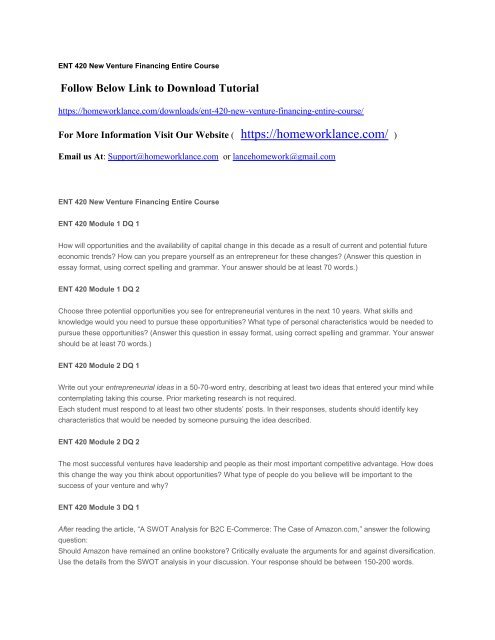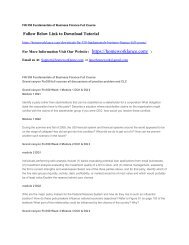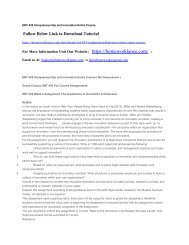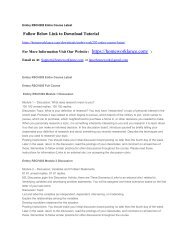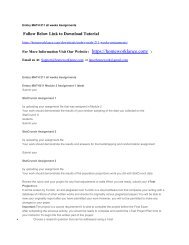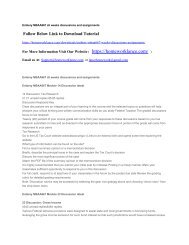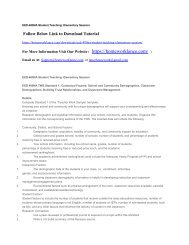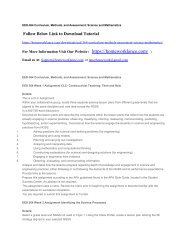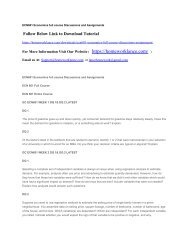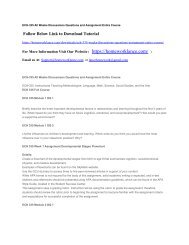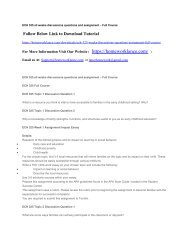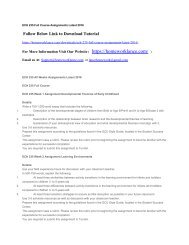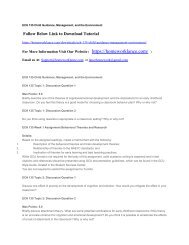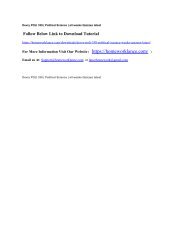ENT 420 New Venture Financing Entire Course
Create successful ePaper yourself
Turn your PDF publications into a flip-book with our unique Google optimized e-Paper software.
<strong>ENT</strong> <strong>420</strong> <strong>New</strong> <strong>Venture</strong> <strong>Financing</strong> <strong>Entire</strong> <strong>Course</strong><br />
Follow Below Link to Download Tutorial<br />
https://homeworklance.com/downloads/ent-<strong>420</strong>-new-venture-financing-entire-course/<br />
For More Information Visit Our Website ( https://homeworklance.com/ )<br />
Email us At: Support@homeworklance.com or lancehomework@gmail.com<br />
<strong>ENT</strong> <strong>420</strong> <strong>New</strong> <strong>Venture</strong> <strong>Financing</strong> <strong>Entire</strong> <strong>Course</strong><br />
<strong>ENT</strong> <strong>420</strong> Module 1 DQ 1<br />
How will opportunities and the availability of capital change in this decade as a result of current and potential future<br />
economic trends? How can you prepare yourself as an entrepreneur for these changes? (Answer this question in<br />
essay format, using correct spelling and grammar. Your answer should be at least 70 words.)<br />
<strong>ENT</strong> <strong>420</strong> Module 1 DQ 2<br />
Choose three potential opportunities you see for entrepreneurial ventures in the next 10 years. What skills and<br />
knowledge would you need to pursue these opportunities? What type of personal characteristics would be needed to<br />
pursue these opportunities? (Answer this question in essay format, using correct spelling and grammar. Your answer<br />
should be at least 70 words.)<br />
<strong>ENT</strong> <strong>420</strong> Module 2 DQ 1<br />
Write out your entrepreneurial ideas in a 50-70-word entry, describing at least two ideas that entered your mind while<br />
contemplating taking this course. Prior marketing research is not required.<br />
Each student must respond to at least two other students’ posts. In their responses, students should identify key<br />
characteristics that would be needed by someone pursuing the idea described.<br />
<strong>ENT</strong> <strong>420</strong> Module 2 DQ 2<br />
The most successful ventures have leadership and people as their most important competitive advantage. How does<br />
this change the way you think about opportunities? What type of people do you believe will be important to the<br />
success of your venture and why?<br />
<strong>ENT</strong> <strong>420</strong> Module 3 DQ 1<br />
After reading the article, “A SWOT Analysis for B2C E-Commerce: The Case of Amazon.com,” answer the following<br />
question:<br />
Should Amazon have remained an online bookstore? Critically evaluate the arguments for and against diversification.<br />
Use the details from the SWOT analysis in your discussion. Your response should be between 150-200 words.
<strong>ENT</strong> <strong>420</strong> Module 3 DQ 2<br />
Discuss how a SWOT analysis should be used as an analytical tool that can help you work through all the information<br />
you have about your business. Why should an entrepreneur conduct a SWOT analysis during his/her new business<br />
venture-planning phase?<br />
<strong>ENT</strong> <strong>420</strong> Module 4 DQ 1<br />
Max Points: 8.0<br />
<br />
<br />
<br />
<br />
<br />
<br />
<br />
For your initial post, choose one of the articles listed below and summarize it in 250-300 words. Focus on how your<br />
article relates to or clarifies the concepts discussed in the Module 4 Readings. (APA format is not required, but proper<br />
grammar and spelling are expected. Make sure you clearly identify the article you are summarizing. When possible,<br />
check previous posts by other students so that you can try to choose an article not already summarized.)<br />
Access the following articles and choose one for this Discussion Forum:<br />
Khavul, S., Bruton, G. D., & Wood, E. (2009). Informal family business in Africa. Entrepreneurship: Theory &<br />
Practice, 33(6), 1219-1238. Retrieved<br />
from http://library.gcu.edu:2048/login?url=http://search.ebscohost.com/login.aspx?direct=true&db=bth&AN=45132275<br />
&loginpage=Login.asp&site=ehost-live&scope=site<br />
Le Breton-Miller, I., & Miller, D. (2009). Agency vs. stewardship in public family firms: A social<br />
embeddedness reconciliation. Entrepreneurship: Theory & Practice, 33(6), 1169-1191.<br />
Retrieved fromhttp://library.gcu.edu:2048/login?url=http://search.ebscohost.com/login.aspx?direct=true&db=bth&AN=<br />
45132278&loginpage=Login.asp&site=ehost-live&scope=site<br />
Mitchell, J. R., Hart, T. A., Valcea, S., & Townsend, D. M. (2009). Becoming the boss: Discretion and<br />
postsuccession success in family firms. Entrepreneurship: Theory & Practice, 33(6), 1201-1218.<br />
Retrieved from http://library.gcu.edu:2048/login?url=http://search.ebscohost.com/login.aspx?direct=true&db=bth&AN<br />
=45132276&loginpage=Login.asp&site=ehost-live&scope=site<br />
Reay, T. (2009). Family-business meta-identity, institutional pressures, and ability to respond to<br />
entrepreneurial opportunities. Entrepreneurship: Theory & Practice, 33(6), 1265-1270.<br />
Retrieved fromhttp://library.gcu.edu:2048/login?url=http://search.ebscohost.com/login.aspx?direct=true&db=bth&AN=<br />
45132272&loginpage=Login.asp&site=ehost-live&scope=site<br />
Shepherd, D., & Haynie, J. M. (2009). Family business, identity conflict, and an expedited entrepreneurial<br />
process: A process of resolving identity conflict. Entrepreneurship: Theory & Practice, 33(6), 1245-1264.<br />
Retrieved from http://library.gcu.edu:2048/login?url=http://search.ebscohost.com/login.aspx?direct=true&db=bth&AN<br />
=45132273&loginpage=Login.asp&site=ehost-live&scope=site<br />
Smith, G. D. (2009). East Africa: Extended families with many rights. Entrepreneurship: Theory & Practice,<br />
33(6), 1239-1244.<br />
Retrieved from http://library.gcu.edu:2048/login?url=http://search.ebscohost.com/login.aspx?direct=true&db=bth&AN<br />
=45132274&loginpage=Login.asp&site=ehost-live&scope=site<br />
Villanueva, J., & Sapienza, H. J. (2009). Goal tolerance, outside investors, and family firm<br />
governance.Entrepreneurship: Theory & Practice, 33(6), 1193-1199.<br />
Retrieved from http://library.gcu.edu:2048/login?url=http://search.ebscohost.com/login.aspx?direct=true&db=bth&AN<br />
=45132277&loginpage=Login.asp&site=ehost-live&scope=site<br />
As an additional post, each student will reply to the posted summary of at least one student (a student that chose a<br />
different article) and discuss how their own article relates and/or contrasts. This summary will be for the participation<br />
grade only.
<strong>ENT</strong> <strong>420</strong> Module 4 DQ 2<br />
Why are constructive dialogue and/or changing strategic direction more difficult for a family business than other<br />
businesses, even though families are supposed to have closer relationships? Support your response with empirical<br />
evidence.<br />
<strong>ENT</strong> <strong>420</strong> Module 5 DQ 1<br />
Describe some ways of using other people’s resources.<br />
<strong>ENT</strong> <strong>420</strong> Module 5 DQ 2<br />
Discuss the premise behind fundraising strategies of the successful entrepreneur<br />
<strong>ENT</strong> <strong>420</strong> Module 6 DQ 1<br />
What primary considerations, in addition to good character, management capability, collateral, and owner’s equity in<br />
the SBA’s loan decision process should be realized in an entrepreneur’s application for a basic 7(a) guaranteed loan?<br />
<strong>ENT</strong> <strong>420</strong> Module 6 DQ 2<br />
Max Points: 8.0<br />
Describe the entrepreneurial nature of the franchising model.<br />
<strong>ENT</strong> <strong>420</strong> Module 7 DQ 1<br />
With your understanding of the commercial lending processes, discuss your comfort level in participating in the<br />
financing efforts of a new business. Explain the lending processes in order from most comfortable to least. As an<br />
entrepreneur, would you feel comfortable with guiding or leading such efforts? Explain why or why not.<br />
<strong>ENT</strong> <strong>420</strong> Module 7 DQ 2<br />
How does a new business go about convincing a commercial lender that the business has a good credit rating?<br />
<strong>ENT</strong> <strong>420</strong> Module 8 DQ 1<br />
Discuss why entrepreneurs who truly know themselves make the best ethical decisions<br />
<strong>ENT</strong> <strong>420</strong> Module 8 DQ 2<br />
What are the ways entrepreneurs can “give back” following a successful harvest?<br />
<strong>ENT</strong> <strong>420</strong> Week 1 Assignment Reflection Matrix 1<br />
Details:<br />
The purpose of the Reflection Matrix assignment is to comprehend, apply, and synthesize key vocabulary terms and<br />
concepts relevant for entrepreneurs. The intent of the assignment is to challenge the student to locate reliable
information and apply that knowledge in a practical manner to a business venture that interests the student, and to<br />
make relevant connections to course objectives.<br />
Create a table with three sections:<br />
1. Definitions<br />
2. Article synopses (2)<br />
3. Application and synthesis statement<br />
Briefly define the following terms: debt, equity, convertible debt, preferred equity, term sheet, private placement<br />
memorandum, target market, and market segment.<br />
Access the GCU Library. Locate two articles from current, reputable business periodicals (e.g., Barron’s, Inc., Forbes,<br />
etc.). The articles need to somehow relate to the vocabulary terms and the entrepreneurial process. Write a synopsis<br />
paragraph that summarizes the main points of each article. Conclude each synopsis with an appropriate reference<br />
note.<br />
Write an application and synthesis statement (300-400 words) that connects the vocabulary concepts and the article<br />
content to an entrepreneurial venture that interests you.<br />
While APA formatting is not required for this assignment, solid academic writing is expected.<br />
This assignment uses a grading rubric. Instructors will be using the rubric to grade the assignment; therefore,<br />
students should review the rubric prior to beginning the assignment to become familiar with the assignment criteria<br />
and expectations for successful completion of the assignment.<br />
You are not required to submit this assignment to Turnitin.<br />
<strong>ENT</strong> <strong>420</strong> Week 2 Assignment Entrepreneur Interview<br />
Details:<br />
Interview an entrepreneur who started a business similar to one that interests you. Write a two-page narrative report<br />
that answers the questions below and makes connections to course objectives. Include a final reflection and<br />
application section that relates what you learned to an entrepreneurial project that interests you. Be sure to address<br />
the following:<br />
1. How did the entrepreneur first discover their business idea?<br />
2. What factors in their life led them to the opportunity and allowed them to pursue it at that particular moment?<br />
3. How were they able to finance the startup process?<br />
4. Did the entrepreneur have to sell part of the company or go into debt?<br />
5. What are the personality characteristics of the entrepreneur that made him/her successful?<br />
While APA formatting is not required for this assignment, solid academic writing is expected.<br />
This assignment uses a grading rubric. Instructors will be using the rubric to grade the assignment; therefore,<br />
students should review the rubric prior to beginning the assignment to become familiar with the assignment criteria<br />
and expectations for successful completion of the assignment.<br />
You are not required to submit this assignment to Turnitin.<br />
<strong>ENT</strong> <strong>420</strong> Week 3 Assignment Business Plan Evaluation<br />
Details:<br />
Access the Internet and locate a business plan for an enterprise that is similar to one that you are interested in<br />
developing.<br />
Write a two-page analysis report that addresses the issues below and makes relevant connections to course<br />
objectives.<br />
Include a final reflection and application section that relates what you learned to an entrepreneurial project that<br />
interests you.<br />
Address the following:
1. Creat a description of the business concept.<br />
2. What is the market size, and can it be independently verified?<br />
3. Are the assumptions of the business plan correct?<br />
4. Is the management credible?<br />
5. Does the management have existing relationships within the market?<br />
6. What is the nature and purpose of the funding.<br />
7. Can the funding be secured independently of the success of the business?<br />
While APA formatting is not required for this assignment, solid academic writing is expected.<br />
This assignment uses a grading rubric. Instructors will be using the rubric to grade the assignment; therefore,<br />
students should review the rubric prior to beginning the assignment to become familiar with the assignment criteria<br />
and expectations for successful completion of the assignment.<br />
You are not required to submit this assignment to Turnitin.<br />
<strong>ENT</strong> <strong>420</strong> Week 4 Assignment Reflection Matrix 2<br />
Details:<br />
The purpose of the Reflection Matrix assignment is to comprehend, apply, and synthesize key vocabulary terms and<br />
concepts relevant for entrepreneurs. The intent of the assignment is to challenge the student to locate reliable<br />
information and apply that knowledge in a practical manner to a business venture that interests the student.<br />
Create a table with three sections:<br />
1. Definitions<br />
2. Article Synopses (2)<br />
3. Application and Synthesis Statement<br />
Briefly define the following terms: market risk, government risk, going concern, holding company, joint venture,<br />
strategic alliance, financial statement, and feasibility study.<br />
Access the GCU Library. Locate two articles from current, reputable business periodicals (e.g., Barron’s, Inc., Forbes,<br />
etc.). The articles need to somehow relate to the vocabulary terms, course content, and the entrepreneurial process.<br />
Write a synopsis paragraph that summarizes the main points of each article. Conclude each synopsis with an<br />
appropriate reference note.<br />
Write an application and synthesis statement (300-400 words) that connects the vocabulary concepts and the article<br />
content to an entrepreneurial venture that interests you.<br />
While APA formatting is not required for this assignment, solid academic writing is expected.<br />
This assignment uses a grading rubric. Instructors will be using the rubric to grade the assignment; therefore,<br />
students should review the rubric prior to beginning the assignment to become familiar with the assignment criteria<br />
and expectations for successful completion of the assignment.<br />
You are not required to submit this assignment to Turnitin.<br />
<strong>ENT</strong> <strong>420</strong> Week 6 Assignment Franchise Investigation<br />
Details:<br />
Access the GCU Library and the Internet. Research business franchising.<br />
Write an essay (600-750 words) that examines the pros and cons of franchising. Be sure to address the following:<br />
1. Discuss the steps involved in typical franchising opportunities.<br />
2. Include a discussion of how the initial financing of franchises differs from other types of businesses.<br />
3. Take a position on whether you would consider pursuing a franchise. Defend your reasoning.<br />
While APA formatting is not required for this assignment, solid academic writing is expected.
This assignment uses a grading rubric. Instructors will be using the rubric to grade the assignment; therefore,<br />
students should review the rubric prior to beginning the assignment to become familiar with the assignment criteria<br />
and expectations for successful completion of the assignment.<br />
You are required to submit this assignment to Turnitin. Please refer to the directions in the Student Success Center.<br />
<strong>ENT</strong> <strong>420</strong> Week 7 Assignment Business Valuation Report<br />
Details:<br />
The purpose of this assignment is to develop and demonstrate mastery of business valuation skills. The business<br />
valuation report should look similar to an actual report presented in the field by entrepreneurs to potential funders.<br />
Relevant connections should be made to course objectives.<br />
Access the Internet and locate a business plan for a business that is similar to one that you are interested in<br />
developing.<br />
Write a two-page business valuation report that answers the following questions:<br />
1. What is the product? What problem does it solve?<br />
2. What is the market?<br />
3. How big is the market?<br />
4. What are the associated risks (i.e., government risk, market risk, industry risk)?<br />
5. What is the discount rate you would apply to this investment?<br />
6. What valuation would you give to this business using discounted cash flow method?<br />
Refer to the proforma profit and loss statement in the financials section of the business plan.<br />
Find the EBITDA numbers in the proforma and use the NPV calculation formula using your calculated discount rate to<br />
establish a valuation for the enterprise.<br />
Explain and justify your valuation.<br />
While APA formatting is not required for this assignment, solid academic writing is expected.<br />
This assignment uses a grading rubric. Instructors will be using the rubric to grade the assignment; therefore,<br />
students should review the rubric prior to beginning the assignment to become familiar with the assignment criteria<br />
and expectations for successful completion of the assignment.<br />
You are not required to submit this assignment to Turnitin.<br />
<strong>ENT</strong> <strong>420</strong> Week 8 Assignment Business Pitch<br />
Details:<br />
Develop a business pitch for an entrepreneurial project that interests you. The business pitch needs to be a realistic<br />
proposal that could actually be presented to potential funders of your venture. Succinctness and clarity are of primary<br />
importance. However, the proposal needs to be thorough and complete, demonstrating deep thought. The business<br />
pitch serves as the culminating activity for the course. Relevant connections should be made to course objectives.<br />
The purpose of this assignment is to challenge students to consider all necessary steps when seeking funding for a<br />
start-up business. Assume that your audience comprises busy professionals who have ten minutes to digest your<br />
proposal.<br />
The business pitch will contain two elements:<br />
1. Executive summary (one page)<br />
2. PowerPoint presentation (5 slides)<br />
The executive summary must address the following elements:<br />
1. Business objective<br />
2. Target market<br />
3. Team strengths<br />
4. Business valuation data
5. Funding source<br />
6. Potential revenue<br />
7. Exit strategy<br />
The PowerPoint presentation needs to provide an easy-to-read visual summary of the information contained in the<br />
executive summary. The presentation should persuade potential funders to support your venture.<br />
While APA formatting is not required for this assignment, solid academic writing is expected.<br />
This assignment uses a grading rubric. Instructors will be using the rubric to grade the assignment; therefore,<br />
students should review the rubric prior to beginning the assignment to become familiar with the assignment criteria<br />
and expectations for successful completion of the assignment.<br />
You are not required to submit this assignment to Turnitin.


